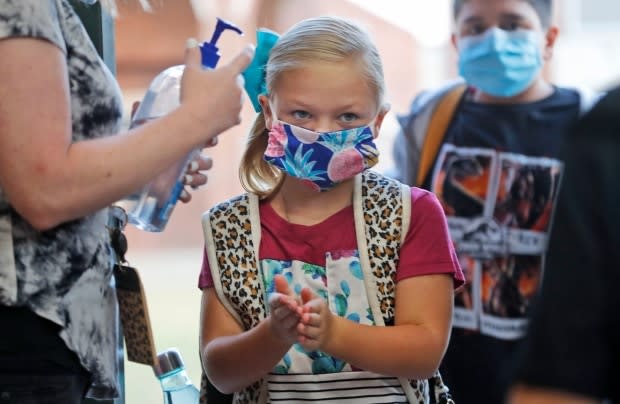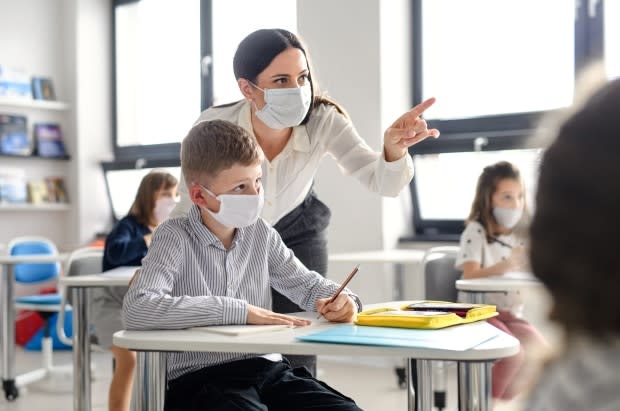You have more back-to-school questions. We have more answers
Earlier this week, we tried to answer some back-to-school questions parents might have.
The response to that story was tremendous, and we've been hearing from parents that still have more questions.
We've tried to answer a few of the common ones, below.
What will a school day look like?
It will look different.
Students, especially elementary, will spend the vast majority of their day in their homeroom class, with little or no movement between rooms.
"Students will sit at labelled and assigned desks/locations within their classrooms," according to the Ottawa-Carleton District School Board.
Outdoor learning and breaks will be encouraged, according to the boards. Physical education will also take place outside.
"We are working out options for lunch where students could be at another location, as long as they remain in their cohort."
Singing will be discouraged, in music class, and any other classes.
Ottawa Public Health said in a statement to CBC it is advising against singing, "due to the risk of projection of respiratory droplets."
All of this might sound overwhelming for little kids, but one expert said he anticipates they'll have an easier time adapting than teenagers.
Still, Dr. Michael Cheng, a psychiatrist at CHEO, advised parents to get their kids back into a school routine immediately, including earlier bedtimes.

What will classrooms look like?
There has been a lot of discussion about Plexiglas, and how it will be used in classrooms.
The first line of defence should still be daily symptom screening, distancing, masks and cohorting, according to Ottawa Public Health.
It added physical barriers, such as Plexiglas, can still play an important role.
The Catholic board said it will be using Plexiglas in high traffic areas, such as the front reception area of the main office.
"An additional 3,000 portable Plexiglas screens have been ordered to provide a space in each classroom with a physical barrier. Classroom educators will determine the best use of this in each classroom," said the OCSB.
It also said it has ordered 20,000 corrugated privacy dividers to use between tables "in order to assist students in maintaining distance from one another within the classroom setting."
Should my child wear a face shield?
A face shield could add an additional layer of protection, according to one epidemiologist.
"We haven't talked a lot about face shields. I think it's a tool that's been underused," said Raywat Deonandan.
Students in Grade 4 and above will have to wear a face mask, even while seated in class all day long.
The school boards, taking cues from OPH, have said face masks are preferred, but a face shield can be used as a "tiered approach."
"Masks keep other people safe. It prevents me, if I'm sick, from infecting you. But a face shield helps protect me from you, a little bit," said Deonandan.
"Those two together, there's a fairly robust level of protection. And as uncomfortable as some people might find it, if it's just for the school bus ride, that makes things quite safer," he said.

What's being done to address ventilation concerns in schools?
Fresh air is key, experts said.
Both boards have said they will encourage staff to keep windows open, when possible.
Ottawa winters, being what they are, could present some challenges to that.
On Thursday, Education Minister Stephen Lecce announced $50 million for upgrades to ventilation systems.
Crews have been inspecting ventilation equipment in schools over the summer, according to the school boards. Repairs have been made where necessary.
Pedestal fans in classrooms should be pointed toward the windows, and not at students, the school boards have advised.

What if my child has asthma?
"We've got lots of kids in the community with asthma," said Dr. Dayna Bell, a CHEO pediatrician.
"Our most common time of year to see asthmatics is the third week of September, because all the children have gone back to school and picked up their first cold," she said.
"If you can get in with your doctor in the next two weeks, make sure that you have a plan for how to control your child's chronic disease, and that you know what the next steps are."
Bell also stressed the importance of making sure you and your child get a flu vaccine this year.
I'm worried about my child's teacher, and other school staff, who are immunocompromised. Will they be given the option to work from home?
We've heard from quite a few parents who said they're worried their kids are going to infect teachers and other school staff.
The OCDSB said all its staff were asked to submit requests for specific accommodations earlier this summer to the human resources department.
Those requests will be "assessed on a case by case basis in line with the employer's obligations under the Ontario Human Rights Code," said a statement from the board.
The Catholic board said in a statement, "As detailed in our teachers' collective agreement, teachers are entitled to use their sick leave when they are not well enough to attend their workplace."
It added many measures will be in place to protect staff, and they will all participate in health and safety training before the first day of school.

My child requires hands-on help at school. Should I send them back?
Some students require a bit more help at school.
We've heard from parents who said they don't know whether to send their kids back. What's best for their child, and the support staff who will have to be in close contact?
Ottawa Public Health said there are "additional considerations" for parents in these situations to weigh.
"The primary issue is that in providing direct support there is a loss [of] physical distancing and therefore the potential for disease transmission in either direction."
It said daily symptom screening and masks will be even more important in those cases.
How worried should I be about my teenager?
It's a difficult time to be a teenager.
Cheng said it's crucial for parents to start a dialogue with their teens now about back-to-school stress during the pandemic. Watch for signs they may be withdrawing from friends or family, he said.
He said it's natural for kids, especially teenagers, to thrive on face-to-face interaction.
Some students will handle the virtual component to high school learning better than others, he said.
"A lot of kids really are going to struggle despite our best efforts," he said.
His advice?
Nudge your teenagers to get their faces out of their phones and interact with their peers in a safe, physically distanced way.
Should I insist my kids be kept together while at school?
It might not be a bad idea, say experts. Whether it's on the school bus, or in class.
We've heard from parents of twins, and also of siblings who are only a grade apart in age, and could be put in a split-class. Should they ask schools to keep siblings together, to help keep their family's contacts low?
Ottawa Public Health said in response there are two things to consider.
Yes, from a public health perspective it makes sense to keep siblings together to "reduce their potential exposure to COVID-19 by having them in one class cohort, versus two separate class cohorts."
"However, this needs to be balanced against any adverse effects of having the siblings in a class together every day for the school year," said OPH.


